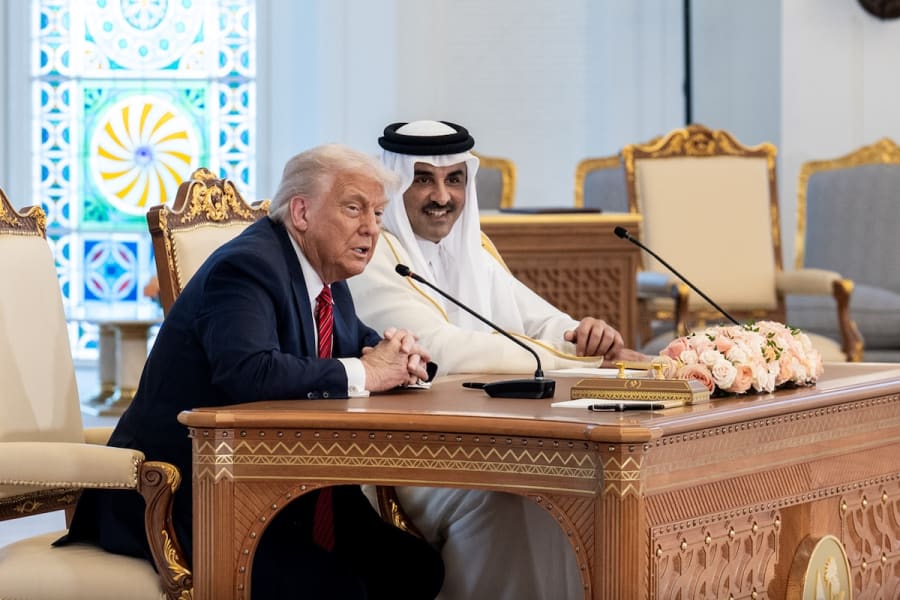From pariah to partner: How US President Trump changed his perception of Qatar
Once accused of financing terrorism, Qatar is now celebrated by Trump as a key US ally, announcing mega-investment deals

U.S. President Donald Trump’s visit to the Middle East has been billed as an economic mission, with White House officials signaling ahead of his departure to Saudi Arabia, Qatar, and the United Arab Emirates that the focus would be on attracting large-scale investments to the United States – not traditional diplomacy.
Yet, judging by his statements and actions during the tour, Trump appears determined to emerge not only as a "deal maker" but also a "peacemaker."
But is it possible to be both when it comes to Qatar?
On one hand, Qatar is an immensely wealthy Gulf state eager to do business with the West and home to the Al Udeid Air Base, a critical U.S. military presence in the region. On the other hand, it has long been criticized for supporting extremist Islamist elements.
Qatar has a documented history of funding the Muslim Brotherhood and providing a safe harbor to leaders of its Palestinian branch, Hamas. According to the Foundation for Defense of Democracies, Qatar also maintains connections with Al-Qaeda, the Taliban, ISIS, and Iran's Islamic Revolutionary Guard Corps (IRGC) – some of which the Qatari government denies.
Despite this controversial track record, the White House on Wednesday announced that President Trump had finalized economic agreements worth over $243.5 billion with Qatari Emir Sheikh Tamim bin Hamad Al-Thani. The centerpiece of the deal includes the largest-ever sale of Boeing aircraft and GE Aerospace engines to Qatar Airways, totaling $96 billion.
“This historic agreement will support 154,000 U.S. jobs annually, amounting to over 1 million jobs throughout the production and delivery phases,” the White House said in a statement.
The fact sheet claimed the total “economic exchange” between the U.S. and Qatar is worth at least $1.2 trillion – though it remains unclear how that figure was calculated.
The scope of these deals reportedly spans the energy and technology sectors, and an expanded defense relationship.
“Yesterday we signed an agreement for Qatar to purchase $42 billion worth of the finest American military hardware – including THAAD missile batteries, Pegasus refueling aircraft, Desert Vipers, light armored vehicles, amphibious combat vehicles, the MQ-9B and the Sky Guardian drones,” Trump said in a speech to American troops at Al Udeid.
Would the Trump of 2017 have endorsed such a partnership?
Back then, the American president had harsh words for the Qatari government.
"The nation of Qatar, unfortunately, has historically been a funder of terrorism at a very high level," Trump said at the time.
That statement came shortly after Saudi Arabia, the UAE, Bahrain, and Egypt severed diplomatic ties with Qatar and closed their airspace to Qatari flights. These countries demanded that Qatar shut down its Al Jazeera network, scale back ties with Iran, and sever connections with extremist groups, such as the Muslim Brotherhood.
That regional crisis was eventually resolved in 2021 through a reconciliation agreement brokered by Kuwait, Oman, and the United States – despite the U.S. initially backing Saudi Arabia.
Under former U.S. President Joe Biden, Qatar has become a major non-NATO U.S. ally and plays a pivotal role in mediating ceasefire and hostage-release negotiations amid Israel's ongoing war in Gaza.
But just how deep does this alliance go – and at what cost?
A recent Free Press investigation titled “How Qatar Bought America” reported that the Gulf nation has spent nearly $100 billion cultivating influence across U.S. institutions – Congress, universities, newsrooms, think tanks, and corporations.
Further raising eyebrows is a reported offer from Qatar’s royal family to donate a $400 million luxury jet to President Trump – potentially to serve as the next Air Force One.
Despite concerns about ethics and national security, the president has signaled a willingness to accept what critics and supporters alike have described as a “palace in the sky,” a “Trojan horse,” and even “a bribe.”
This article originally appeared on All Arab News and is reposted with permission.

Tal Heinrich is a senior correspondent for both ALL ISRAEL NEWS and ALL ARAB NEWS. She is currently based in New York City. Tal also provides reports and analysis for Israeli Hebrew media Channel 14 News.













